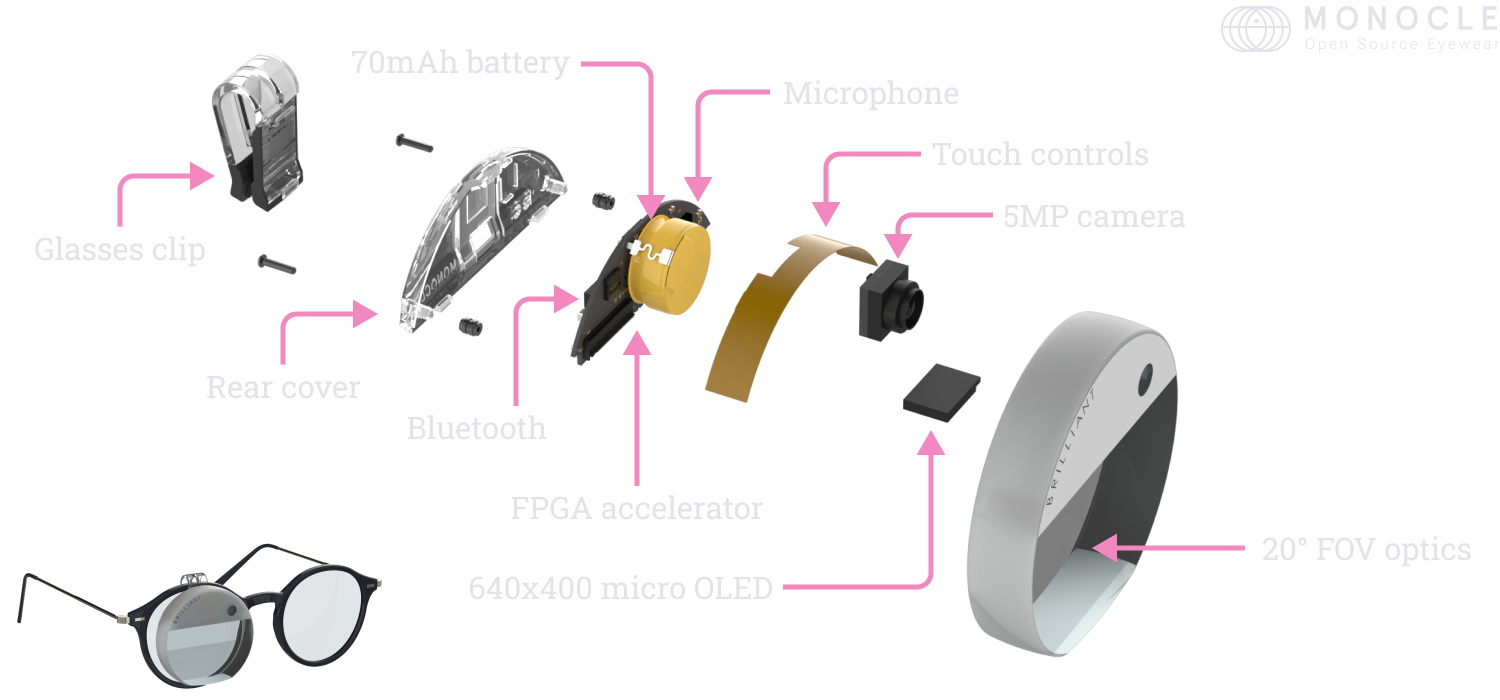In a technological breakthrough, Brilliant Labs has disrupted the Augmented Reality market with its cutting-edge open-source AR lens, Monocle. This innovative wearable starkly contrasts Apple‘s pricey and bulky Vision Pro, offering a more accessible and user-friendly alternative. With Monocle, users can clip the pocket-sized AR lens onto any eyewear or hold it up to their eye, opening up a world of augmented reality experiences. Launched in March, Monocle has captivated tech enthusiasts with its affordability, priced at just $349. Let’s find out more about this fascinating AI-powered invention.

Thinking Outside the Box: Brilliant Labs’ Vision for AR
While other AR and VR headsets tend to confine users to their home environments, Brilliant Labs is breaking the mold. The company’s CEO and co-founder, Bobak Tavangar, emphasized their mission to explore uncharted territories. In an interview with TechCrunch, Tavangar stated, “We are running in the exact opposite direction.”
Also Read: WWDC Highlights: Apple’s Practical A.I. Solutions Revealed
The Fusion of AI and AR: Brilliant Labs’ Ambitious Goal
To seamlessly integrate the AR lens into users’ daily lives, Brilliant Labs aims to embed generative AI into its compact wearable. With this ambitious vision in mind, the Singapore-based startup has secured $3 million in seed funding. The funding round was led by notable industry veterans, including Brendan Iribe (co-founder of Oculus), Adam Cheyer (co-founder of Siri), and Eric Migicovsky (founder of Pebble and former Y Combinator partner), among others.

Monocle’s Open-Source Community Sparks Innovation
The open-source nature of Monocle has sparked a dedicated following among developers and enthusiasts. The AR lens gained widespread attention when a group of Stanford students transformed it into a display for GPT-4. Leveraging the power of generative AI, Monocle can listen to real-time conversations through the user’s smartphone microphone and offer personalized suggestions. This unique functionality has garnered significant interest and showcases the immense potential of fusing AI and AR.
Also Read: Meta Open-Sources All their Promising Projects | Find Out Why
Seamless Connectivity: How Monocle Transmits Data
Monocle relies on a seamless connection between the user’s smartphone and OpenAI‘s server. The device transmits data via Bluetooth, enabling users to receive responses projected onto the AR lens in front of their eye. This streamlined process ensures a fluid and immersive augmented reality experience.

Empowering Developers: arGPT Solution and Its Potential
Brilliant Labs has also developed an in-house application called arGPT, designed to enhance the functionality of Monocle. The arGPT solution facilitates low-latency dialogue with GPT-4 by leveraging Monocle’s microphone and other sensors. Currently, Monocle has primarily attracted developers, hackers, hobbyists, and researchers who are eager to explore the possibilities of this palm-sized device. This collaborative approach encourages innovation and unlocks the full potential of generative AI and AR.
Also Read: Google Adds AI Coding Bot Codey to Google Colaboratory
Miniature Marvel: The Technology Behind Monocle
Despite its compact size, Monocle packs a punch with its array of processors. Equipped with five different processors, including a hackable field-programmable gate array (FPGA) accelerator chip, Monocle handles data from the device’s camera, microphone, and capacitive touch sensor. The use of low-power electronics and miniaturized electronic parts allows the lens to weigh a mere 15 grams, ensuring comfort and portability for users.

A Paradigm Shift in AR: Brilliant Labs’ Market Approach
Brilliant Labs has disrupted the market by eschewing the traditional bulky and expensive headset approach. Instead, the company focuses on delivering an affordable and efficient solution. Tavangar shared insights, stating, “Every other device company was doing bulky, expensive headsets. They weren’t making money out of them.” Brilliant Labs’ focus on unit economics and operational discipline positions them for scalability and profitability.
Also Read: US Stock Market Finds Boost From Artificial Intelligence (AI)
A Glimpse into the Future: Monocle’s Evolution
While Monocle currently relies on smartphones as a relay point, Brilliant Labs envisions a future where the hardware directly connects to the cloud. This eliminates the need for a smartphone host and paves the way for running deep learning models directly on the tiny AR device. This advancement promises even lower latency and functionality, ensuring a seamless experience even in areas with limited internet connectivity.

Beyond Hardware: Expanding Services and Charging for AI-powered Features
Brilliant Labs plans to expand its services beyond hardware sales. By integrating large language models (LLMs), the company envisions offering additional AI-pOpenAI and Meta Sued for Copyright Infringementowered services. While Brilliant Labs initially integrated with GPT due to its well-documented API, the team seeks compressed LLMs to improve efficiency and explore new possibilities. The founder envisions a future where the hardware becomes more powerful while maintaining low power consumption.
Also Read: How To Use ChatGPT API In Python?
Our Say
While exact sales figures remain undisclosed, Brilliant Labs boasts strong profit margins and thrives solely on hardware sales. The company is poised for further success with a foundation built on operational discipline and unit economics. As Brilliant Labs expands its offerings and explores the vast potential of AI and AR, it promises to shape the future of augmented reality experiences.
Image Source: brilliant.xyz







